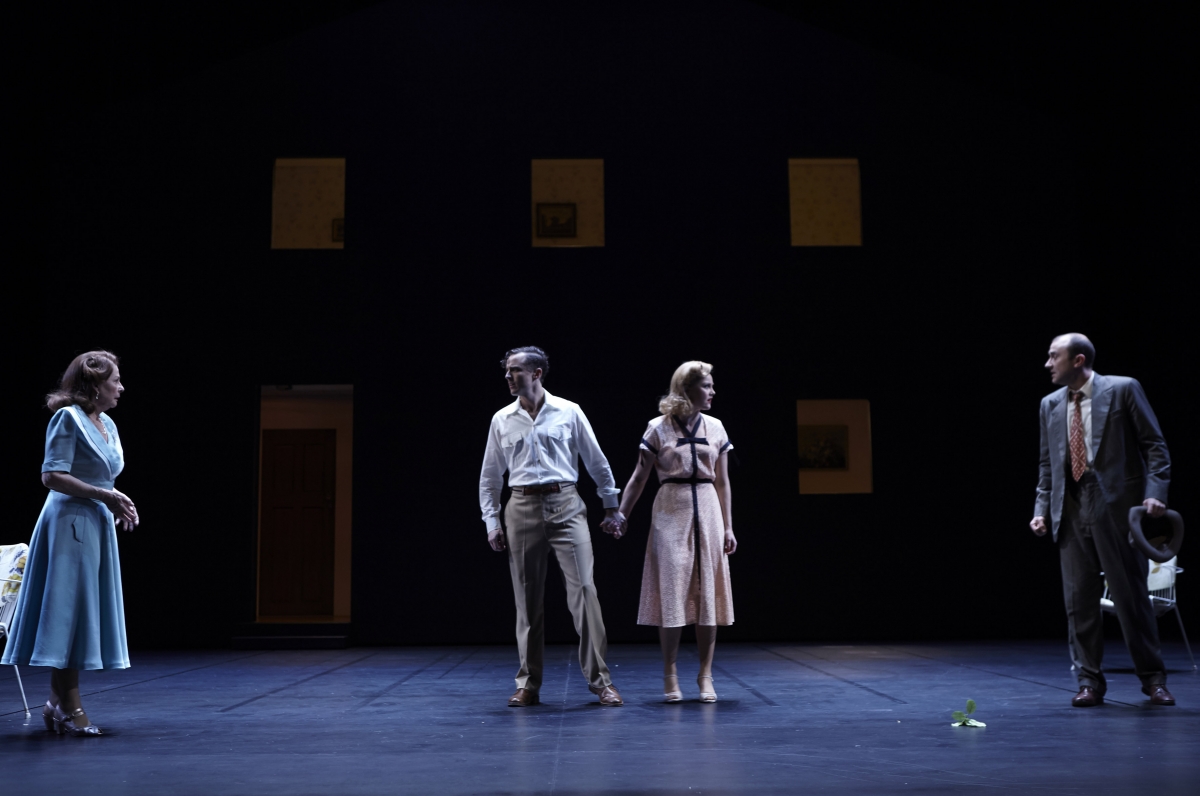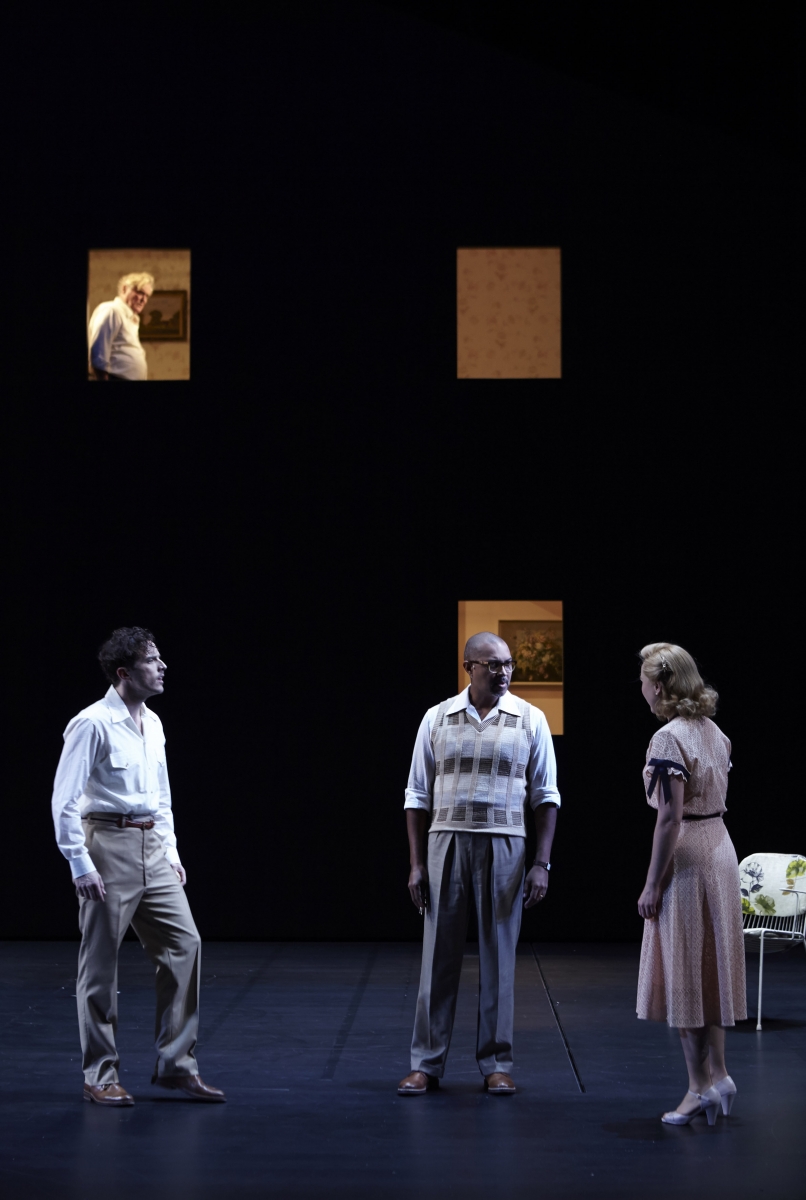★★★½☆ Miller’s breakthrough play still lands a devastating blow nearly 70 years after its Broadway premiere.
Capitalism’s capacity to inspire individual greed would build modern America through war and peacetime and inflect the rest of the western world, implicating more of us as beneficiaries of exploitation as globalisation crashed through borders. We wear the garments of fast fashion chains today, for instance, without a thought for the often-exploited workers in developing countries whose factories are sometimes deadly firetraps.
Playwright Arthur Miller retained the sense memory of the collapse of his father Isidore’s coat business in the wake of the 1929 stock market crash, wiping out the Miller family’s wealth and spinning adolescent Arthur into engagement with the radical politics of Marxist ideology. Born in 1915, Miller had no memory of World War I, and his efforts to enlist in the US Navy for World War II were repeatedly rejected because of knee and wrist damage sustained by an old football injury, the details of which were later recorded in Miller’s FBI file.
So, instead, Miller worked as a fitter in the Brooklyn Navy Yard, occasionally volunteering to work on Navy ships in the Hudson River, while writing patriotic radio plays and a string of unsuccessful stage plays. Miller was haunted, as a self-described “young, fit man barred from a war others were dying in”, and a sense that businesses, as well as some individuals exempted from war duty, were lining their pockets. “It was probably inevitable that the selfishness, cheating and economic rapacity on the home front should have cut into me with the contrast of the soldiers’ sacrifices and the holiness of the Allied cause,” he later recalled. “I was a stretched string waiting to be plucked.”
 Robyn Nevin, Chris Ryan, Eryn Jean Norvill and Josh McConville © Zan Wimberley
Robyn Nevin, Chris Ryan, Eryn Jean Norvill and Josh McConville © Zan Wimberley
In January 1947, when Miller was 31, he had his career breakthrough, when his play All My Sons premiered on Broadway, winning a New York Drama Critics’ Circle Award and Tony awards for best author and best direction of a play, as Miller examined how the war machine aided profiteering, at the cost of human lives, setting up the Keller family at the play’s centre as both beneficiaries and, ultimately, victims in the play’s setting of August 1946. The German dramatist Berthold Brecht, of course, had already mined this territory, presaging war’s cynical profit factor with Mother Courage and Her Children in 1939.
Miller’s play is inspired by a news story that his then mother-in-law saw in an Ohio newspaper, detailing a conspiracy to approve defective aircraft engines for wartime use. In All My Sons, the story becomes one of 21 P-40 fighters crashing over Australia, the aircraft sent into service with its manufacturers’ full knowledge of fine, hairline cracks in the planes’ cylinder heads. These dead men are the sons of the play’s title.
Miller’s capacity to critique a system that can crush individuals would reach its apogee with his greatest play, the Pulitzer prize-winning Death of a Salesman (1949), with its more humanist subtlety about the death of the American entrepreneurial dream. All My Sons has a similarly tragic trajectory, and the rhythms of language and Miller’s strong sense of how to ratchet up guilt and confrontation are all evident here, though this earlier work is slightly weakened by some melodramatic physical fight scenes, and its politics worn overtly on its sleeve.
Kip Williams directs Sydney Theatre Company’s production of All My Sons, and casts Robyn Nevin as the family matriarch, Kate, and Eryn Jean Norvill as Ann Deever, a young woman caught in the family cross hairs. These two fine actors occupied not dissimilar archetypes in Williams’s STC production last year of Tennessee Williams’ Suddenly Last Summer. I wasn’t quite as taken by that production as some, because Kip Williams was overly fond of employing video screens trained on particular actors, thereby dictating where the eye should fall, a practice which if overused is anathema to the idea of live theatre and an audience having the freedom to take in the broad sweep of an ensemble’s reactions and interactions.
Here, though, Williams has opted for a minimalist stage aesthetic, a darkened stage dominated by a large, basic, bland black house with five windows, a door and a triangulated roof. Most of the action takes place outside, in front of the house, but as the play progresses we get to see activity within, via the windows. I was at first disappointed that, while the actors wore period outfits – floral frocks for the women and short sleeve, collared shirts and beige pants for the men – the house wasn’t, say, a timber slat home that evoked the era depicted. Such a more literal approach was taken for staging an emotionally affecting and dramatically good production of All My Sons at Darlinghurst Theatre, directed by Iain Sinclair in 2013.

John Howard, Chris Ryan, Bert LaBonte and Eryn Jean Norvill in Sydney Theatre Company’s All My Sons © Zan Wimberley
As the play progressed, however, Williams’ staging made sense. The big, simple house would read well in the back row. Its generic appearance and lack of period ornamentation came for me to signify the constancy through time of the oft-flimsy façade of the capitalist project’s unfettered wealth and prosperity as a constant source of good. The staging proves especially effective in the play’s denouement, though the disadvantage is in the first act, when what is supposed to be morning could be confused for night.
Marshall Napier’s poignant performance as patriarch Joe Keller in the earlier Darlinghurst Theatre production remains memorable for me, but here an equally burly actor, John Howard, occupies the role, pouring himself into Joe’s uneasy effort to hold up his collapsing family foundation, while subtly flinging the blame to his business partner. He’s a mighty presence.
Robyn Nevin’s performance though for me is the greatest drawcard: I found her mesmerising as her tightly coiled character archly, anxiously controlled the other players through artless personal putdowns. Nevin moves with a fine nuance across the rhythms of Miller’s language, as Kate Keller deludes herself with her manufactured reality, lest she have to admit the devastatingly deadly consequences of her shared greed. Particular mention, too, of Josh McConville, who as George Deever appears for just a short time, in the second act, but presents as a physical force almost dancing across the stage while carrying the burden of truth.
Sydney Theatre Company presents All My Sons at Roslyn Packer Theatre until July 9











Comments
Log in to join the conversation.